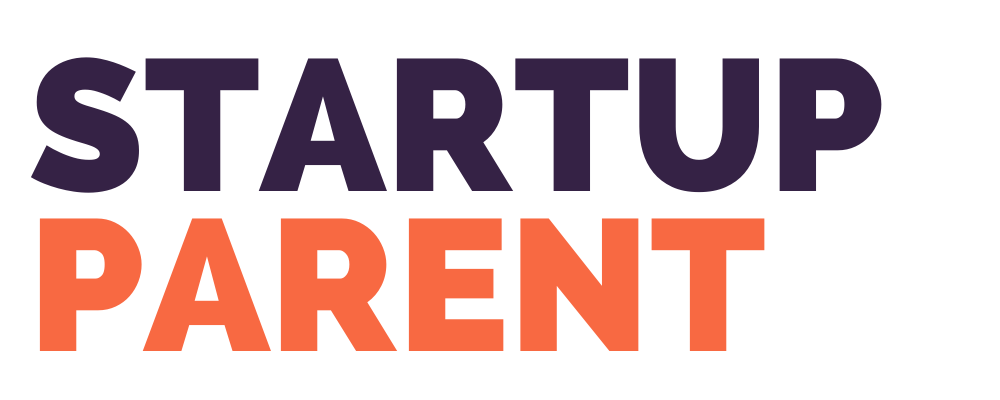Unicorn Uterus, Surrogacy, and Triblings — All While Building A Fashion Empire: Episode #215 with Sarah LaFleur
Sarah LaFleur’s journey as an entrepreneur and parent hasn’t always been clearcut.
In her first job out of school, Sarah was working at a management consultant firm. Early in her tenure there, one of the partners asked the employees, “which of you in here thinks that he or she is an entrepreneur, raise your hand.” Only one person raised his hand. When the partner turned to Sarah to ask what she thought, she admitted that she hadn’t really considered it.
His response was, “Well, if you’ve never thought about it, you’re probably not going to be an entrepreneur. If you’re an entrepreneur, you just know deep down that you’re meant to be an entrepreneur.”
Sarah walked away from that interaction thinking, “okay, I guess I’m not an entrepreneur.” It turns out they were both wrong.
After years of building her fashion empire MM LaFleur, Sarah got married and started thinking about motherhood.
Before trying to conceive, a friend recommended Sarah and her husband visited a fertility specialist. She was unexpectedly diagnosed with a “unicorn uterus,” and was told that becoming a mother was not going to be an easy journey.
Sarah didn’t know that her path to parenthood would include IVF, surrogacy, and ultimately, three babies born in six weeks — but she wouldn’t change a thing.
These days, Sarah describes herself as a part-time CEO and a part-time mom. She built a team that she could trust to run the business in her absence, which allows her to be present as her children grow up. She acknowledges that her approach doesn’t fit the mold of the Silicon Valley hustle culture entrepreneur, and that’s okay.
Sarah wants people to know that there are many shapes entrepreneurship can take.
It is possible to run a business and grow a family on your terms — as long as you have the right people supporting you in that vision.
In this conversation, Sarah and Sarah talk about how to know if you’re meant to be an entrepreneur, the many versions entrepreneurship can take, the experience of leading a team through the unpredictability of the pandemic, and the kind of people you need in your corner. They also discuss the importance of believing in your vision as an entrepreneur, the challenges Sarah faced raising capital for MM LaFleur, and how the path to motherhood is anything but predictable.
Listen to The Startup Parent Podcast on Apple ★ Spotify ★ Overcast ★ Castbox or wherever you listen to podcasts. Find another podcast player or the RSS feed here.

FEATURED GUEST
Sarah LaFleur, CEO and Founder of MM LaFleur
Sarah LaFleur is the founder and CEO of MM LaFleur, a company that meets the clothing needs of professional women who want style without compromising comfort or function. Sarah graduated from Harvard University in 2006, then worked as a management consultant before starting her fashion empire in 2013. She is the mother of three 3-year-olds, a self-proclaimed “insane New Yorker,” and is passionate about supporting working women.
EPISODE SUMMARY
Sarah and Sarah discuss:
- The different presentations of entrepreneurship, and alternatives to hustle culture. For many of us, we hear “entrepreneur” and think about the Silicon Valley stereotype — tech bros living at the office and eating ramen to make their dreams happen. Sarah and Sarah tallk about the various paths to entrepreneurship, and finding the one that works for you.
- The importance of mindset as an entrepreneur, and trusting yourself even if you can’t see exactly where you’re going. According to Sarah L, one of the most challenging parts of building MM LaFleur was fundraising. The folks she was trying to reach didn’t fully understand the problem or the value of the solution she was offering, and Sarah shares how she persisted in spite of that resistance. Sarah P shares her experiences navigating unknown waters, and how focusing on the things that excite you can keep you from getting lost along the way.
- How Sarah discovered that she has a “unicorn uterus” and what that meant for her motherhood journey. On the advice of a friend, Sarah and her husband sought the help of a fertility specialist prior to becoming pregnant. The doctor initally dismissed Sarah’s proactive approach to starting a family, but soon realized that she had a rare condition — a unicornuate uterus — that would make carrying a full-term pregnancy difficult. She shares the unconventional ways they chose to grow their family, and what that looks like today.
- Sarah’s experience with IVF and surrogacy, and how she and her husband ended up with three babies in six weeks. Sarah and her husband decided to try IVF, but struggled to carry a pregnancy to term. After multiple miscarriages they decided to enlist the help of a surrogate, who became pregnant with twins. Around the same time, discovered that Sarah was also pregnant. They ended up with three babies within six weeks, and life has been a rollercoaster ever since. But according to Sarah, it’s absolutely worth it.
Links and resources mentioned:
“At M.M.LaFleur, we’re not a workwear business. We’re a company that supports working women.”
— Sarah LaFleur
CONVERSATION HIGHLIGHTS
Key ideas & supporting quotes from the conversation
There is more than one way to be an entrepreneur.
“There’s a pretty masculine vision of what an entrepreneur is, which is: you throw yourself in 150% and you live with all of your teammates, and you don’t even shower because you’re working on this so hard. And yes, maybe that was Mark Zuckerberg’s version of being an entrepreneur and, kudos to him, he’s been massively successful. But I think that’s actually not what it looks like for a lot of people — and I will say, a lot of parents, and a lot of women who have other responsibilities outside the job that they do every day.” (SLF)
“When people think successful artists, they think Picasso and that’s all you do, you don’t even take care of your family. You leave your kids that you have with multiple women, all in the pursuit of art. And so I’m hopeful that we’re seeing new versions of entrepreneurship.” (SLF)
“I just want to pull out some of these themes. The first one is that $80,000 or $100,000 can go a really long way. I’ve heard that from so many founders, and your starting capital of 75 or 72k, that chunk of money — and then all the hustling you did with the tutoring in New York City — I know it feels like you’re just scraping things together, but you were able to build the prototype. And there’s people out there who are bootstrapping that are just realizing, ‘Wait a second, I could take out a loan or I could get 100k, and then I could hire three people and this could be revolutionary.’” (SKP)
Entrepreneurship requires belief in yourself and the solution you’re offering — especially if others don’t see it.
“I was like, someone should do something about this at some point. I didn’t really think that person should be me. But when I felt like backed into a corner, I was like, Well, I’ve always had this idea. Maybe I actually want to give it a try.” (SLF)
“I know mindset is such a buzzword – but really, the deep internal challenge to of, ‘I’ve got an idea. How does it work? How do I figure this out? Am I the right person? Am I good enough?’ I don’t know what it was like inside your head, but I just feel such… What’s the word for when you also feel it? I empathize with it. Yeah, like I just like Yep, that’s true. That’s just- because you’re in the middle of the leap. And you have no idea. It’s like driving through fog and you’re just like, ‘I hope someone sees my fog lights.’” (SKP)
“I feel like I jump off the end of one island and I see my island that I want to swim to in the distance, and so I start swimming, but I pick my head up and the current’s so strong that I can’t even see the island that I want to swim to. And it would be so much quicker and so much easier if I just swam back to the island that I came from. For me, that meant finding another corporate job. And so to kind of put your head down and say like, ‘I’m not quite sure where the island is anymore, but I’m gonna keep swimming.’” (SLF)
“I think I found it especially tiring because a lot of people who were sitting on the opposite side of the table didn’t relate to the problem. I was selling a product that served busy working professional women, and most venture capitalists are not that; they are men. So they would say, “well, let me ask my wife about that. Let me ask my girlfriend about it. Let me talk to my sister about it.” And I think this doesn’t happen as much as it used to, but back when I was fundraising for the first time in 2013-2014, a lot of that education had not happened. I think in some cases, it still hasn’t happened, but back then it had not happened at all. And so it was just painful. It was trying to get these people to understand a problem that they couldn’t relate to. It was really like pulling teeth.” (SLF)
“My mom – in all her wisdom – said ‘in the startup days, because you’re gonna get so many no’s, you should try to surround yourself with a bunch of Yes People,’ which is kind of counterintuitive to every piece of advice most people have gotten. But she was like, ‘Don’t worry. Enough people will tell you no at the beginning. It’s really important to have Yes People who actually believe what you’re trying to do.’ And I think that is also a piece of advice that very early stage entrepreneurs can use.” (SLF)
Being a leader requires you to make tough decisions about how you spend time and grow your business.
“You were making tremendous decisions in the spring of 2020 in the face of incomplete information, which to me, that’s one of the hardest things about leadership. You can look back and be like, ‘Oh, I would have made a different decision,’ but you’re making decisions in limited time with very limited information, and the information is always changing, and it affects people’s lives in many ways. Either way you go and affect someone’s life.” (SKP)
“I can no longer be the hardest working person at the company. I can’t believe actually just said that out loud. I’m a little bit embarrassed to say it but in terms of sheer hours, I just, I can’t.” (SLF)
“I’m quoting RBG… but I think she said something along along the lines of, family was a respite from work and work was respite from family. One was a respite from the other, and I really, truly feel that way. Both helped me do the other better, even if I can’t put as much time into each as I’d like.” (SLF)
“A friend of mine is an amazing chef. She’s like a top chef, Iron Chef winner multiple times over. And she said to me, ‘if I cut the vegetables, if I’m doing the job of a prep cook, that’s the most expensive prep cook there ever was.’ And she was like, I need to stop being the prep cook. And if I know that someone else could be doing this job, then I need to ask someone else to do it and not feel bad about it. And I think that is a lesson that I’ve that I’ve had to learn — I will say, I’m still learning, because I think it conflicts with one of my other values, which is also one of my company values: nothing above you, nothing below you. Like, be the person who takes out the trash. And I think I pride myself on that. But then sometimes I’m like, this is a bad use of my time. I try to be the chef, and, I really try to make sure that what I’m doing is what enables other people to do their jobs. I try to not be the prep cook.” (SLF)
“There’s much to be learned about entrepreneurship from open water swimming.”
— Sarah LaFleur
Becoming a parent changes how you show up at work and how your plans unfold.
“I think in some ways, I’m sure it limits my abilities as a CEO. And in some ways, I think it, it makes me stronger, because it just forces me to say, okay, these are all the decisions that I have to make, and this is the only time I have to do them, so what’s gonna happen?” (SLF)
“I am slower. I sometimes only have four or five hours in the day to do my best work. Days can be like today where I wake up, all of a sudden I have a head cold, right? And it’s so unpredictable, parenting. I’ve heard you say that before, but it’s just, everyday is chaos, and I know there’s there’s this quiet desperation in so many of us just to have a five day work week, just to like be able to count on hours.” (SKP)
“I am struggling with it. I actually would love some wisdom on it. I feel like I’ve become one of those like insane New Yorkers that people across the world make fun of… I’m usually up around five so I can have two hours of silence and do whatever I need to do, like, drink my tea. Take a walk. Think about things. Except my kids also think now it’s hilarious to get up earlier. So my kids were up at 5:45 the other morning and it totally wrecked all my plans. I had a plan to go on a walk and call my little sister who lives in Tokyo, and I didn’t get to do any of that. I’m so pissed about it.” (SLF)
We need honesty and grace from others, and for ourselves, because parenting while building a business is really hard.
“Despite being a CEO, I’m not that much of a control freak. But I still feel. I get angry. I feel angry when these kinds of things happen. So I’m looking for answers. I wish I had wisdom to give, and if anything, I don’t know.” (SLF)
“Boy, do I feel you. They have a sixth sense. You’re like, ‘I’m gonna get up early at five.’ And they’re like, ‘me too!’ And you’re just like… the rage at five and you’re like, ‘leave me alone for just 45 minutes to drink the coffee!’ It’s an intense experience. And I feel you. I feel so much. It’s not demoralization, it’s not quite guilt, I don’t know what the feeling is, but I just feel so bad because I don’t want to let people down. I take longer to answer emails, I’m behind on things, and I know people are waiting for me. Sometimes I really have that like, ‘come on Sarah, get your stuff together.’ Like ‘Sarah, what’s going on?’ But the only thing I’ve learned to do is just ask for forgiveness. I email people and I tell them, ‘I email slowly. I’m often delayed. People have to remind me of things. Bless you for sticking with me. Thank you.’ That’s all I can do.”
“It’s so funny because I’m very comfortable giving other people grace. When other people don’t respond to me. I don’t think ‘what an ash-hole,’ I’m just like, ‘gosh, they must be so busy.’ You know? I don’t take it personally at all, and yet, when you don’t respond to an email you’re like, ‘I am a terrible, horrible person. Why can’t I just respond to an email?’ I wish we would allow ourselves a little more leeway.” (SLF)
Parenting is hard, and reliable childcare is life-changing.
“I say this without kind of an exaggeration. I really felt like there were moments where I almost kind of lost my mind between ages of one and two. That was also coupled with all of us getting COVID at some point, and so it was me, my husband, my three kids, and my mother who happened to be visiting from Tokyo, and we all got COVID together and had to quarantine together for two weeks. They did not want to sit still and they’re incredibly mobile, but at the same time, it’s like they have no sense for danger. They were about to throw themselves down the staircase at any given point. I think that particular year was just so so crazy challenging that now, everything in comparison seems just a little bit easier. And I think having having nursery school, having a dependable place where I can drop them off every day at 830, is I mean, that also been life-changing.” (SLF)
“Childcare is absolutely, positively amazing, and so necessary in so many ways.” (SKP)
Sarah LaFleur’s top pieces of advice for entrepreneurs.
“The number one advice I give to entrepreneurs who are not the Mark Zuckerberg ‘Let me go live in a dorm with three other people and eat ramen every day,’ is if you have other responsibilities, get a side hustle. Get a job that just pays the bills. It could be anything. It can be like — my husband thought he wanted to be a novelist and so he was dog running for a while. It could be be working at Starbucks. It could be tutoring. It could be 100 things. But I think I see a lot of people say, ‘Okay, I’m gonna save up $100,000 in my current job and then after I’ve saved that amount, then I’m going to quit and pour my everything into that startup.’ And I always say, starting a startup takes a lot of time, and you don’t want to be against this clock that you see ticking. You don’t want to see your savings account dwindling in one direction, wondering and panicking whether your idea is going to come together in time before your money runs out. And so, I think just having that source of revenue, whatever that might be, gives you a little bit of breathing room to keep going because these things take a lot of time.” (SLF)
“It’s all hard, and I never want to sugarcoat that. But I think a lot about my mom or my grandmother — both my grandmothers actually, my Japanese one and my American one — it was kind of unthinkable for her, as it was for most Japanese women growing up 50-60 years ago, to have have a job outside the house. And then my mom, brilliant woman she was, she got her MBA from Columbia. She’s one of the first Japanese women to do that. And I think she could have been so many things, and she she has done so much with her career, but she always said, ‘I didn’t have the kind of opportunities that you did. There was no opportunity for women like me to raise money, ever.’ And it’s not like the playing field has gotten all that much better, but back to what we were talking about earlier, I do think there’s small progress being made. And so I try to kind of remind myself that I am actually living my grandmother’s dream, and I know I’m living my mom’s dream – she tells me that – and so I do try to keep that big picture in mind, and realize how lucky I am.” (SLF)
“I still struggle with that sometimes. I’m kind of like a part-time mom and a part-time CEO. It just feels like the time disappears into thin air.”
— Sarah LaFleur
QUOTES FROM THE EPISODE
Excerpts from the transcript of the conversation
Sarah LaFleur: “It’s very, it’s very, it can be very sad. There’s no other way to put it.”
Sarah K Peck: “I don’t think it’s gross at all. I think it’s magical.”
Sarah LaFleur: “I do think it’s all hard, and I never like, I never want to sugarcoat that.”
Sarah LaFleur: “At some point, I kind of had to draw a line and saying, like, I can’t, I can’t keep running a company and doing this other full-time job, which is IVF. I mean, I was, I think I calculated spent over 200 hours at the doctor’s office in one year. And I kind of had to draw a line and say like, enough is enough. I was I was exhausted to the bone. And my therapist said something to me that really helped put things in perspective and she was like, “don’t forget, like you, your, your mission is to become a mom. It’s not to become pregnant.”
Sarah LaFleur: “One of the things that I was like proud about, we were, I went to drop my kids off and my nursery school teacher said, “you know, when most kids cry, they cry for mommy. Your kids your kids are the only kids who say ‘mommy, daddy,’ and it gives us a good sense that your husband’s really involved.””
Sarah LaFleur: “That is what pitching is, it is really having to convince them and getting them to see your point of view.”
Sarah LaFleur: “it’s an exhausting, it to me, I find it incredibly exhausting to have to kind of convince people that there is this market size, that there is this customer, that there is this product that really solves a problem.”
Sarah K Peck: “Feeling good in your clothes was about feeling good about how you look, but not actually feeling like, the texture and the softness and the drape and the like, just the stability and all of those different pieces.”
Sarah LaFleur: “if you just think about, okay, MM LaFleur, their main customers are women who go into an office Monday through Friday, and then suddenly, they’re not going to the office at all. In fact, they’re not even leaving their house. And like, if you could think of some, like, macro thing that happened that would destroy a business, like, this would have been it, you know? And, and it really almost did. And so that was scary.”
Sarah LaFleur: “I think you only really understand what it feels like to have a true true business partner when, when you feel like you can actually be like, I’m going to, I’m going to pretend like the company doesn’t exist, and all decisions are going to are going to start and stop with you; the buck stops with you. And actually, I, you know, and I trust you to do that.”
Sarah LaFleur: “I try to kind of remind myself that I am actually probably, I’m living my grandmother’s dream.”
“There’s a quality when someone’s honest, really honest about it. They’re like, ‘Oh, it’s not just me.’ It’s actually really validating to hear.”
— Sarah K Peck
GRAPHICS
If it resonates, share this episode and feel free to share these graphics.
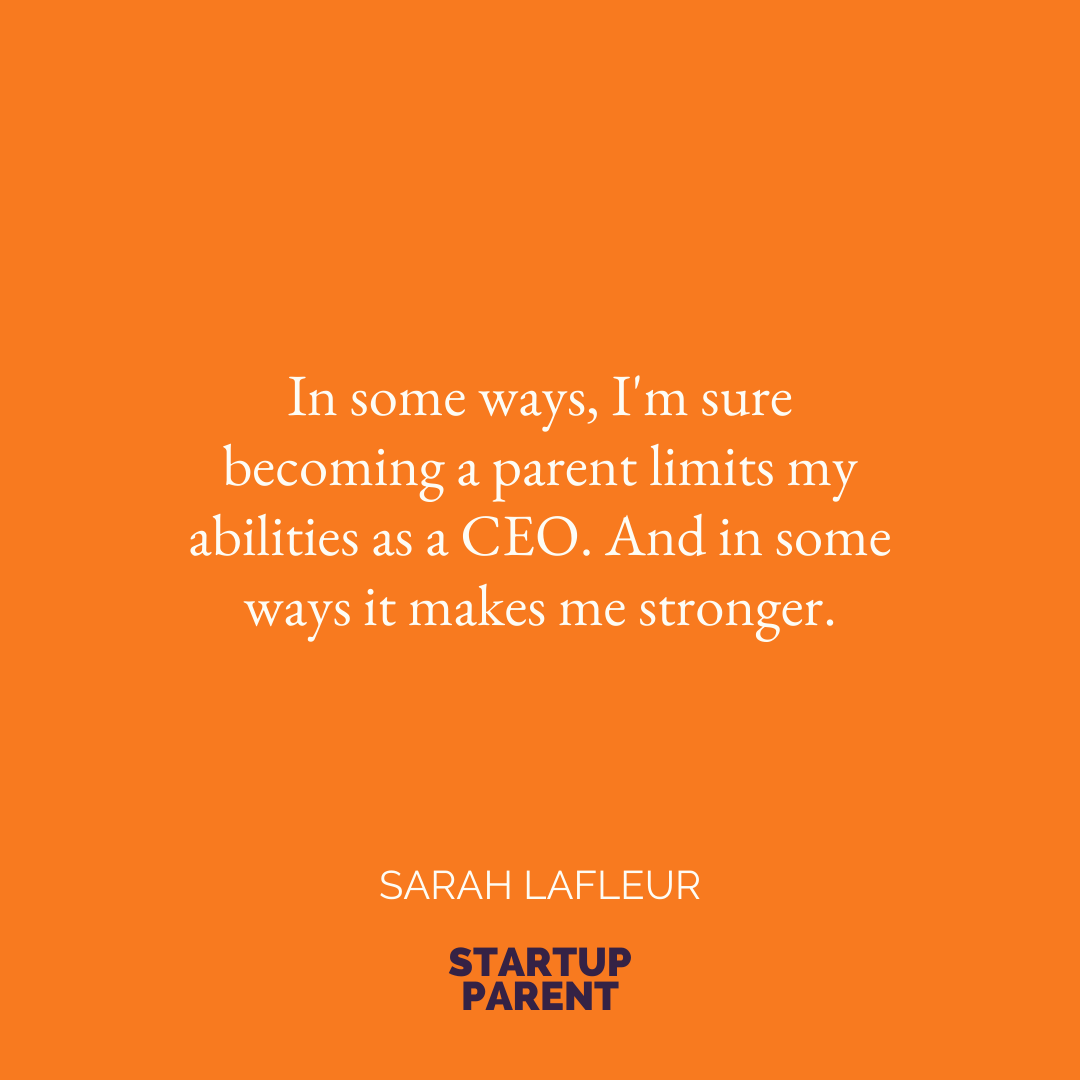
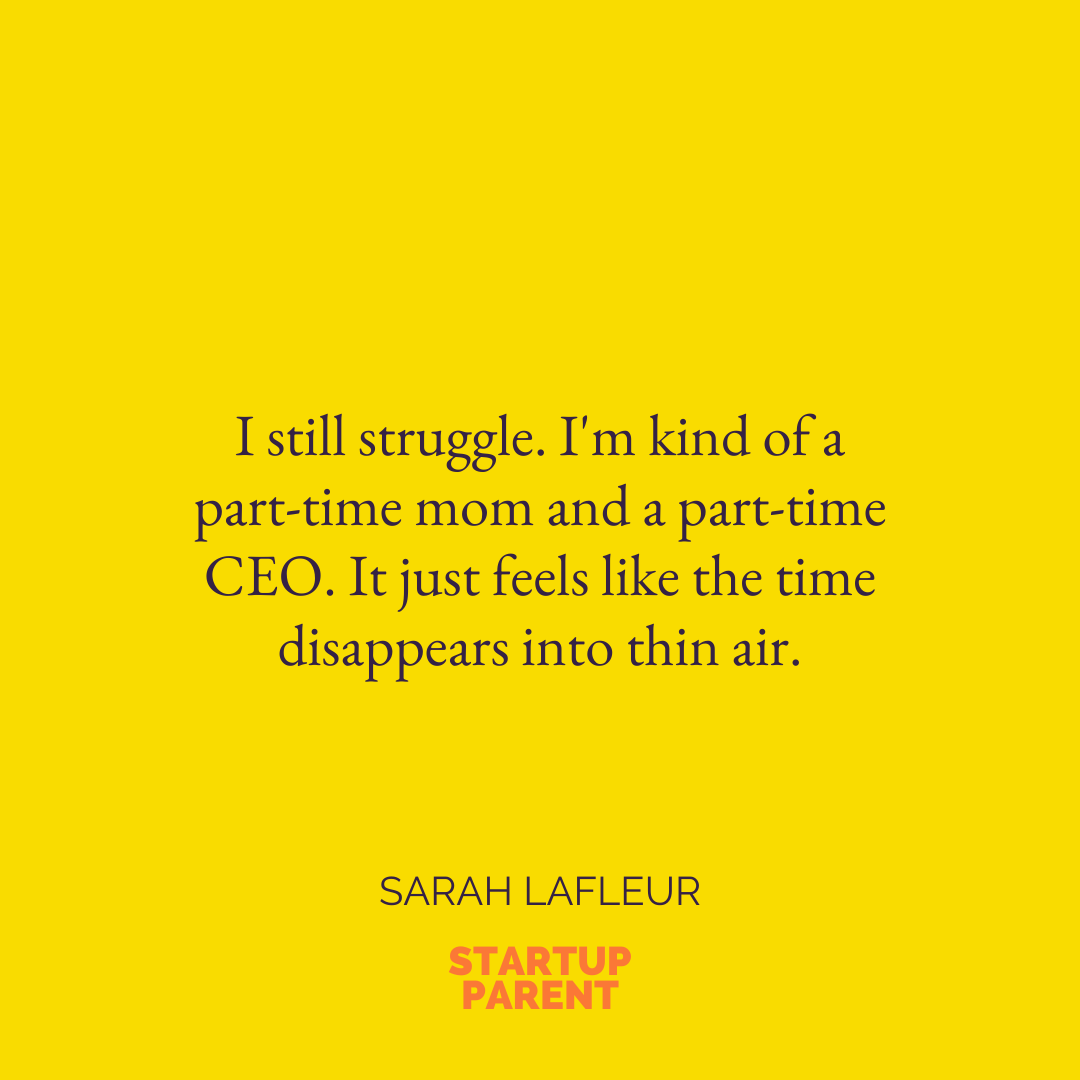
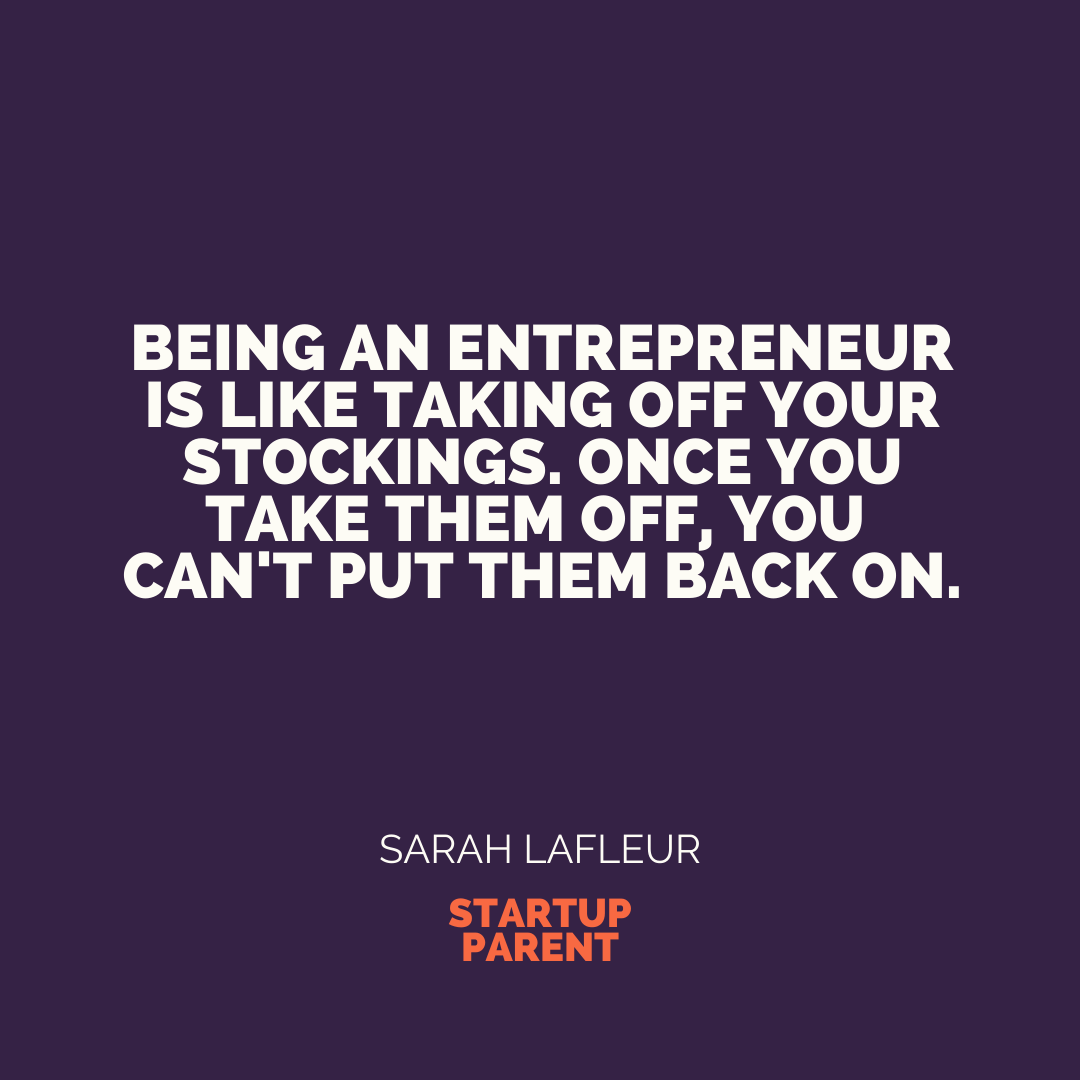
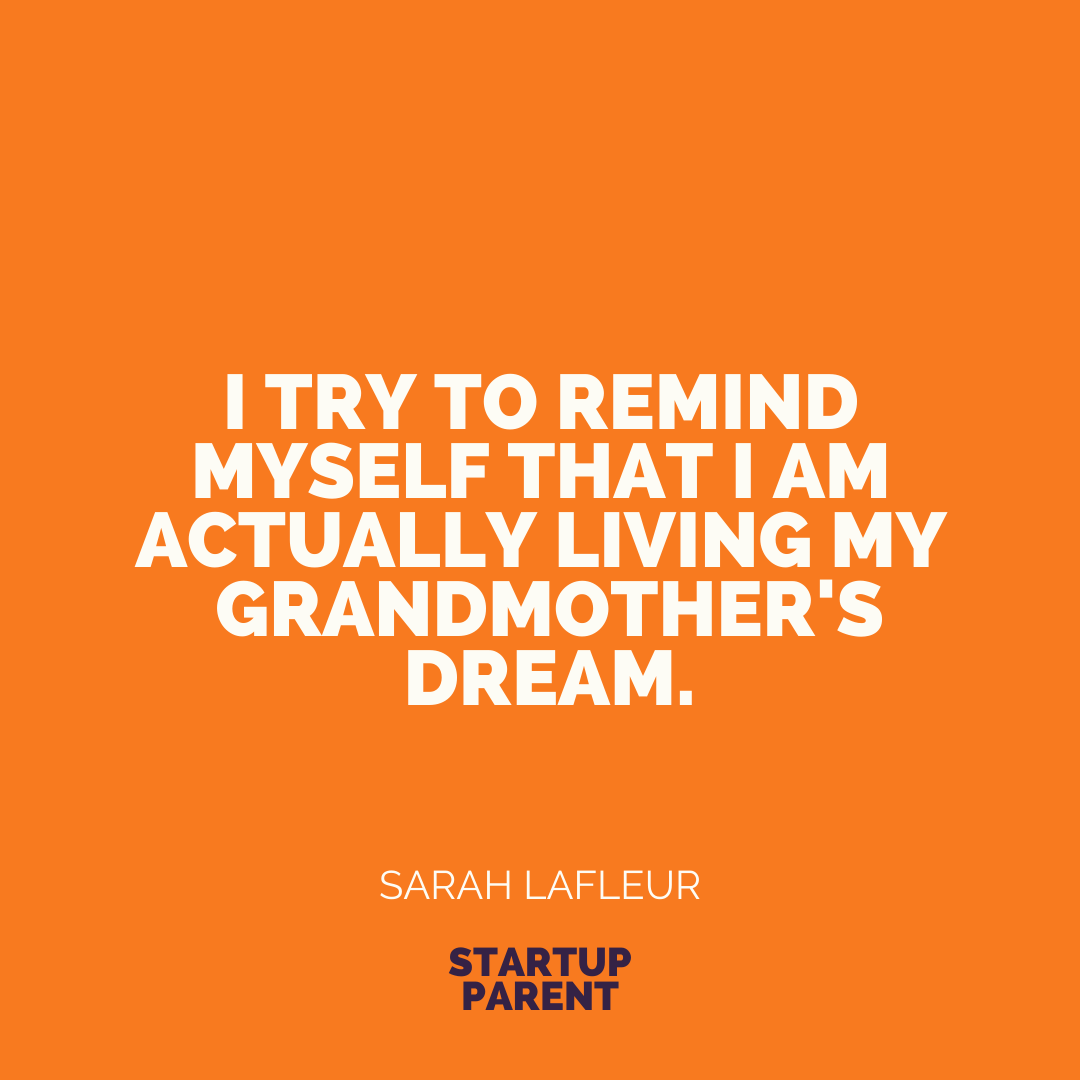
Listen to The Startup Parent Podcast on Apple ★ Spotify ★ Overcast ★ Castbox or wherever you listen to podcasts. Find another podcast player or the RSS feed here.
ABOUT THE STARTUP PARENT PODCAST
If you're growing a business, leading a team, or figuring out entrepreneurship and you have kids, this podcast is for you. We go in-depth with founders and entrepreneurial parents about what it really takes to have babies, grow businesses, and get a little bit of sleep. Sign up for the newsletter to get new episodes in your inbox. And leave us a review on iTunes.
Listen to The Startup Parent Podcast on Apple ★ Spotify ★ Overcast ★ Stitcher ★ Castbox or wherever you listen to podcasts. Find another podcast player or the RSS feed here.
